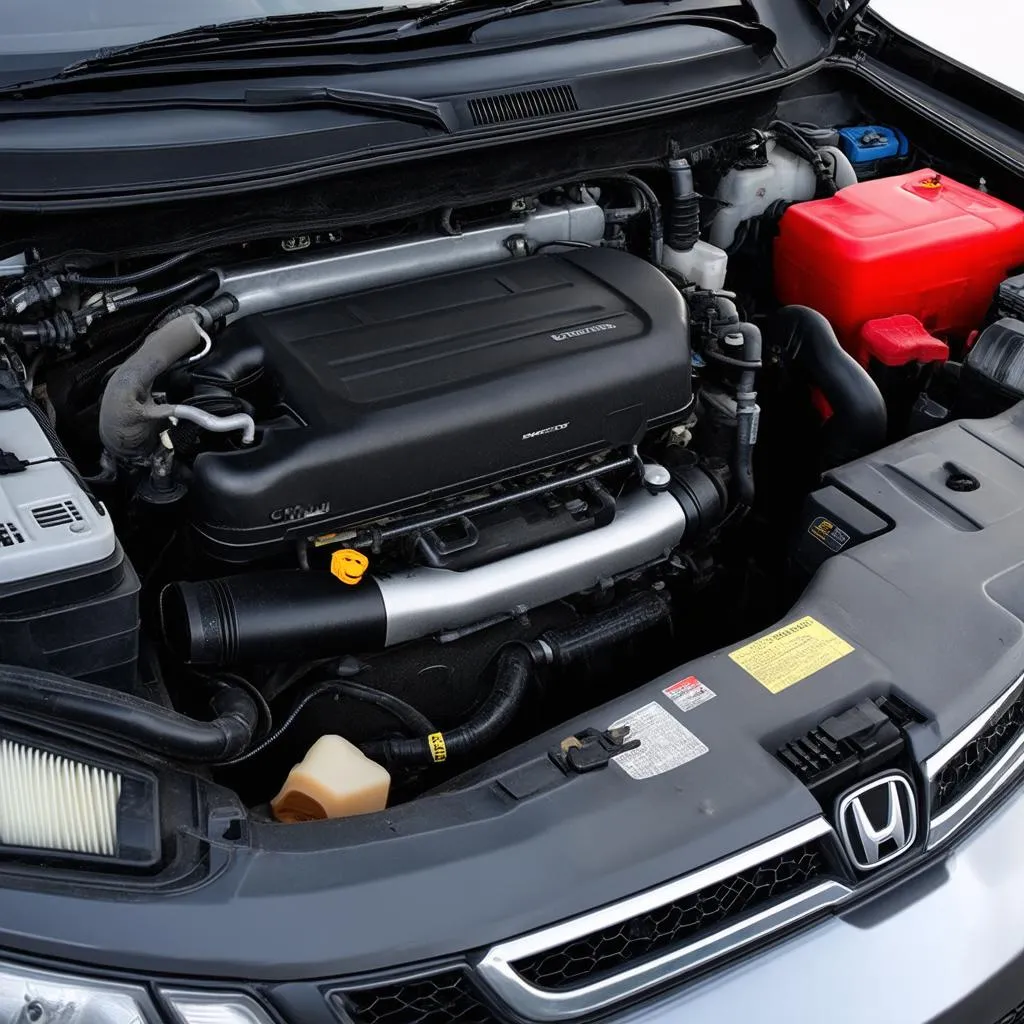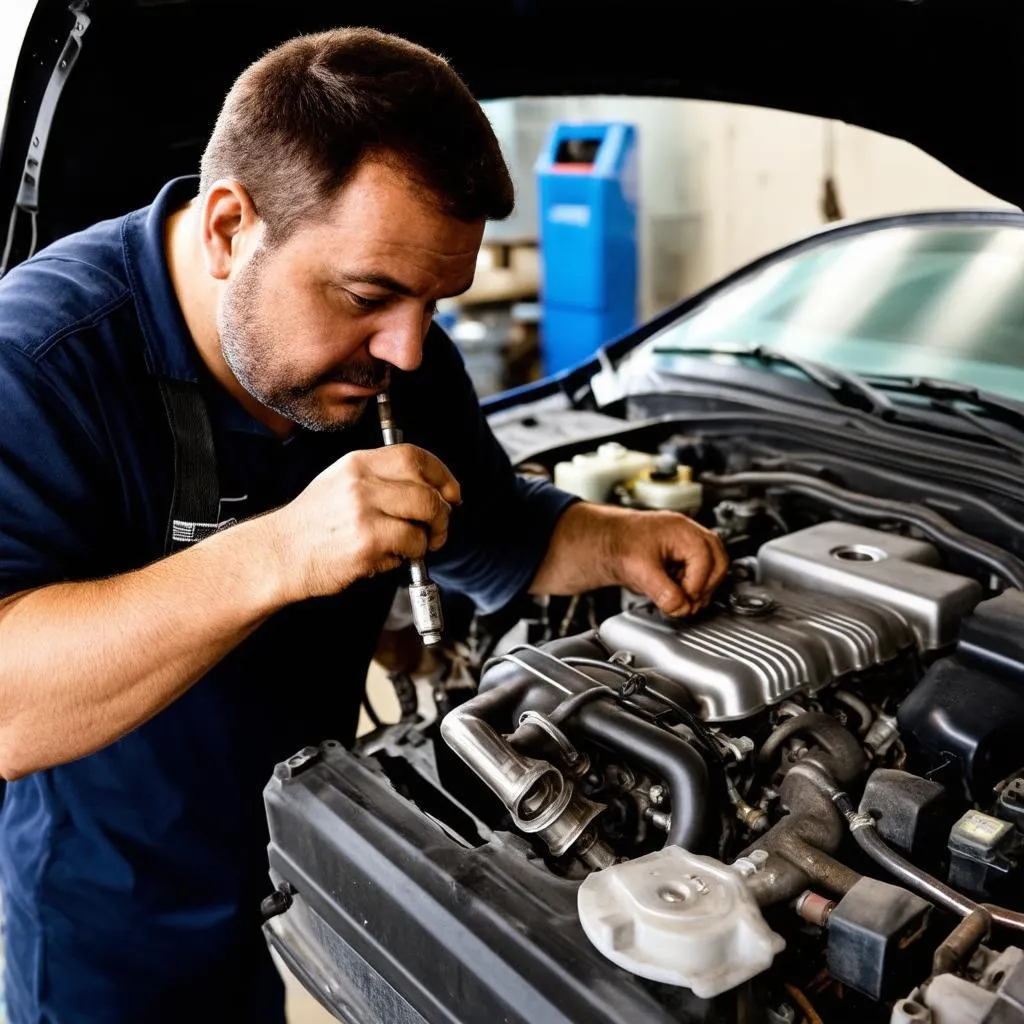Have you ever been driving your trusty 2004 Honda CR-V, only to be greeted by that dreaded Check Engine light? And then, to make matters worse, your trusty OBD-II scanner throws a curveball at you with the cryptic code “P1157?” Don’t worry, we’ve all been there. It’s like trying to decipher ancient hieroglyphics, right? But fear not, fellow CR-V enthusiast, this article is here to demystify this common code and guide you toward a solution.
What Does P1157 Really Mean?
Before we dive into the technical nitty-gritty, let’s simplify things. Imagine your CR-V’s engine as a well-coordinated orchestra. Each part plays a vital role in creating the symphony of power that propels you down the road. Now, the P1157 code is like a dissonant note, signaling a potential issue with the “Air Fuel Ratio (A/F) Sensor 1 Bank 1 Sensor 1 Circuit Low Voltage.”
In simpler terms, your CR-V’s computer, the Engine Control Module (ECM), isn’t getting the right signal from a sensor responsible for monitoring the air-fuel mixture entering the engine. This sensor, often referred to as an oxygen sensor, plays a crucial role in optimizing fuel economy and minimizing harmful emissions.
The Importance of a Balanced Air-Fuel Ratio
Just like a perfectly balanced recipe creates a delicious meal, a balanced air-fuel ratio ensures your CR-V’s engine runs smoothly and efficiently. When the air-fuel mixture leans too far in either direction (too much air or too much fuel), it can lead to a host of problems:
- Poor fuel economy: A rich mixture (too much fuel) can guzzle gas like it’s going out of style.
- Reduced engine performance: A lean mixture (too much air) can lead to hesitation, stumbling, and decreased power.
- Increased emissions: An imbalanced mixture can result in higher emissions, which is bad for the environment and could cause you to fail an emissions test.
Common Causes of the P1157 Code
Now that we understand the significance of a balanced air-fuel ratio, let’s explore some common culprits behind the P1157 code:
- Faulty A/F Sensor (Oxygen Sensor): This is often the primary suspect. Like any hard-working component, oxygen sensors can wear out over time.
- Wiring Issues: A frayed, damaged, or corroded wire in the sensor’s circuit can disrupt the signal to the ECM.
- Vacuum Leaks: A leak in the intake manifold or other vacuum hoses can introduce unmetered air into the engine, throwing off the air-fuel ratio.
- Fuel System Problems: Issues with the fuel injectors, fuel pressure regulator, or fuel pump can also lead to an imbalanced mixture.
Diagnosing and Fixing the Problem
While the P1157 code points us in the right direction, pinpointing the exact cause requires a bit of detective work. Here’s a step-by-step approach:
-
Check for Loose Connections or Damaged Wiring: Start by visually inspecting the wiring harness connected to the A/F sensor. Look for any obvious signs of damage, corrosion, or loose connections.
-
Inspect the A/F Sensor: A visual inspection of the sensor itself can sometimes reveal problems. A heavily fouled or damaged sensor might need replacement.
-
Test the Sensor’s Voltage: Using a digital multimeter, you can test the sensor’s voltage output. This requires some technical know-how, so referring to a repair manual or seeking professional help is recommended.
-
Check for Vacuum Leaks: Listen for hissing sounds coming from the engine bay, which could indicate a vacuum leak. You can also use a carburetor cleaner to spray around potential leak points while the engine is running. If the engine idle changes, you’ve likely found a leak.
-
Inspect the Fuel System: Checking fuel pressure and inspecting fuel injectors often require specialized tools and knowledge. If you suspect a fuel system issue, it’s best to consult a qualified mechanic.
 Engine Bay
Engine Bay
FAQs: 2004 Honda CR-V OBD Code P1157
Here are answers to some common questions about the P1157 code on a 2004 Honda CR-V:
-
Q: Can I still drive my CR-V with a P1157 code?
- A: While you might be able to drive for a short distance, it’s not recommended. Driving with an imbalanced air-fuel ratio can potentially damage your engine in the long run.
-
Q: How much does it cost to fix a P1157 code?
- A: The cost of repair can vary greatly depending on the underlying cause. A simple sensor replacement might cost a few hundred dollars, while a more complex fuel system issue could run into the thousands.
-
Q: Can I fix the P1157 code myself?
- A: If you’re comfortable with basic car maintenance and have some mechanical skills, you might be able to tackle some of the diagnostic steps and even replace the A/F sensor yourself. However, for more complex issues, it’s always best to seek professional help.
 Mechanic Working on Car Engine
Mechanic Working on Car Engine
Similar OBD-II Codes and Their Meanings:
While P1157 is specific to the A/F Sensor 1 Bank 1 Sensor 1 circuit, here are some related codes you might encounter:
- P1158: A/F Sensor 1 Bank 1 Sensor 1 Circuit High Voltage
- P1164: O2 Sensor Heater Resistance (Bank 1, Sensor 1)
- P1165: O2 Sensor Heater Circuit Open (Bank 1, Sensor 1)
These codes relate to the same sensor or its circuit, suggesting a potential issue in that area.
Beyond the Technical: A Holistic View
While understanding the technical aspects of car repair is essential, some car owners find solace in exploring alternative perspectives. In some spiritual traditions, encountering car troubles is seen as a reminder to slow down, pay attention to the details, and ensure everything is in balance, much like the delicate balance required in an engine’s air-fuel mixture.
It’s fascinating how this concept of balance transcends the mechanical world and finds resonance in various aspects of life. Whether you subscribe to such beliefs or not, there’s no denying the importance of maintaining balance in all areas of our lives.
Need More Help with Your Honda CR-V?
We hope this article has shed some light on the enigmatic P1157 code and given you a better understanding of its potential causes and solutions.
If you’re still experiencing issues with your 2004 Honda CR-V or need further assistance with any automotive diagnostics tool, don’t hesitate to reach out to our team of experts. We’re available 24/7 to provide support and guidance. Contact us via Whatsapp at +84767531508, and let us help get your CR-V back on the road and running smoothly!
